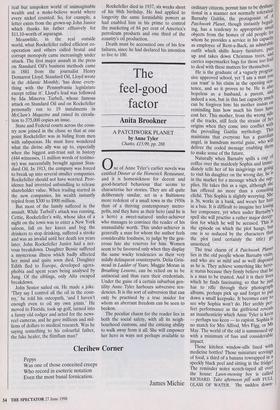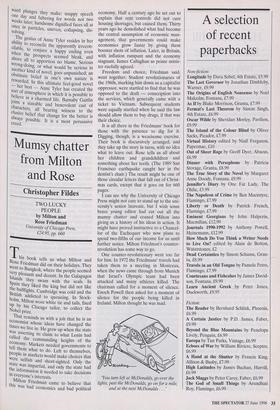The feel-good factor
Anita Brookner
A PATCHWORK PLANET by Anne Tyler Chatto, £15.99, pp. 288 One of Anne Tyler's earlier novels was entitled Dinner at the Homesick Restaurant, and it is homesickness for decent and good-hearted behaviour that seems to characterise her stories. They are all quite deliberately similar, set in a Baltimore more redolent of a small town in the 1950s than of a thriving contemporary metro- polis, and they have as their hero (and he is a hero) a sweet-natured under-achiever who manages to convince the reader of his unassailable worth. This under-achiever is generally a man for whom the author feels considerable fondness, to judge by the gen- erous fate she reserves for him. Women seem to be favoured only when they display the same wacky tendencies as their very mildly delinquent counterparts. Delia Grin- stead in Ladder of Years, Maggie Moran in Breathing Lessons, can be relied on to be antisocial and thus earn their credentials. Under the guise of a certain suburban gen- tility Anne Tyler harbours subversive ten- dencies. It is the sort of subversion that can only be practised by a true insider for whom an aberrant freedom can be seen to beckon.
The peculiar charm for the reader lies in both the social safety, with all its neigh- bourhood customs, and the enticing ability to walk away from it all. She will empower her hero in ways not perhaps available to ordinary citizens, permit him to be dysfunc- tional in a manner not normally tolerated: Bamaby Gaitlin, the protagonist of.14. Patchwork Planet, though instantly begun' ing, has a tendency to appropriate 010 objects from the homes of old people for whom he provides a service in his capacity as employee of Rent-a-Back, an admirable outfit which shifts heavy furniture, Puts, up and takes down Christmas trees, anu., carries supermarket bags for those too frau to deal with these matters for themselves.
He is the graduate of a vaguely progres- sive approved school, yet 'I am a man You can trust' is his claim in the opening sell- tence, and so it proves to be. He is als°, hopeless as a husband, a parent, and indeed a son, but in this last capacity much can be forgiven him: his mother insists on reminding him how much his fines have cost her. This mother, from the wrong stile of the tracks, still feels the strains of her origins when they come into conflict with the prevailing Gaitlin mythology. This maintains that everyone has a guardian angel, in humdrum mortal guise, who ill deliver the coded message enabling then' to make sense of the future. Naturally when Barnaby spills a cup of coffee over the maidenly Sophia and imme- diately tells her of his misgivings on going to visit his daughter on the wrong day, be IS in the market for a message which she sup- plies. He takes this as a sign, although she has offered no more than a consoling cliché. This Sophia is slightly worrying. she is 36, works in a bank, and wears her halt in a bun. It is difficult to imagine her losing her composure, yet when under Barnaby s spell she will practise a rather major decep- tion for which he will be accused. This 15 the episode on which the plot hangs, but one is so seduced by the characters that the plot (and certainly the title) g° unnoticed.
The true charm of A Patchwork Planet lies in the old people whom Barnaby visits; and who are as mild and as well disposed as he is. They achieve something like hero- ic status because they firmly believe that he is a man to be trusted. And it is their lives which he finds fascinating, so that he just has to rifle through their photograph albums, perhaps pick up and forget to put down a small keepsake. It becomes easy to see why Sophia won't do. Her archly per- fect performance as the girlfriend reveals an inauthenticity which Anne Tyler is keen — perhaps too keen — to exploit. Sophia is no match for Mrs Alfrod, Mrs Figg, or Ms May. The world of the old is summoned up with a minimum of fuss and considerable impact. Those kitchen window-sills lined with medicine bottles! Those miniature servings of food, a third of a banana rewrapped in a speckly black peel and sitting in the fridge! The reminder notes scotch-taped all over the house: Lawn-mowing boy is called RICHARD. Take afternoon pill with FULL GLASS OF WATER. The sudden down- ward plunges they make: snappy speech one day and faltering for words not two weeks later; handsome dignified faces all at Once in particles, uneven, collapsing, dis- solving.
The genius of Anne Tyler resides in her ability to reconcile the apparently irrecon- cilable, to conjure a happy ending even when the prospects seemed bleak, and above all to apportion no blame. Serious wrong-doing, or what would be serious in another kind of novel, goes unpunished; an obstinate belief in one's own nature is rewarded. In this ultimate feel-good novel — her best — Anne Tyler has created the sort of atmosphere in which it is possible to believe in a charmed life. Barnaby Gaitlin joins a sizeable and benevolent cast of characters, all bearing witness to the elusive belief that change for the better is always possible. It is a most persuasive creed.



























































 Previous page
Previous page